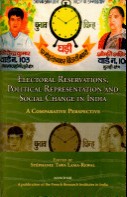Electoral Reservations, Political Representation and Social Change in India : A Comparative Perspective

- Year :2005
- Pages :210
- Price :525Rs
- ISBN :81-7304-622-0
- Editor :Manohar CSH
The chapters analyse the working of reservations in reference to two closely connected yet distinct issues: the effectiveness of reservations as a means towards political representation; and their relevance as instruments of social change.
The book thus offers a collective, though partial, stock-taking exercise, and adds to our understanding of reservations as a policy, their limitations, and their principal and secondary effects.
Contents
Introduction Stéphanie Tawa Lama-Rewal
- A Quest for Identity through Politics: The Scheduled Castes in Uttar Pradesh
Sudha Pai - Safeguards or Segregation? Reservations for the Scheduled Castes in Bihar
Prakash Louis - Reservations and Social Change: The Case of the North-East
Walter Fernandes - The Policy of Reservations for Scheduled Tribes
Bhupinder Singh - Electoral Reservations for Scheduled Tribes : The Legitimization of Domination
Virginius Xaxa - Empowered without Reservations: OBCs in Uttar Pradesh and Bihar
Meenakshi Jain - Reservations for Backward Classes in Kranataka’s Panchayati Raj Institutions
K.S. Narayana - Reservations for Women in Urban Local Bodies : A Tentative Assessment
Stéphanie Tawa Lama-Rewal
Contributors








